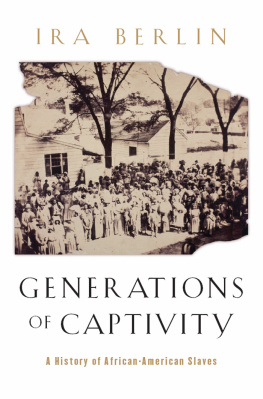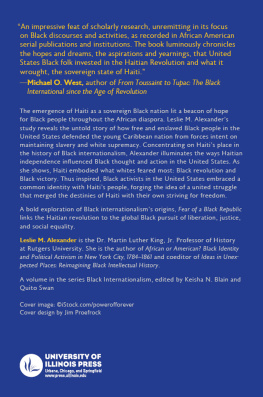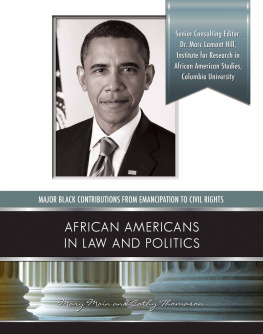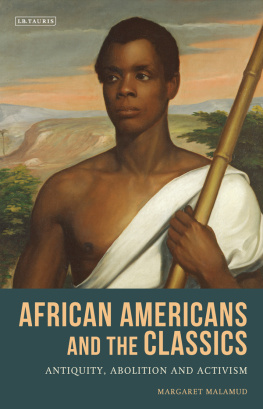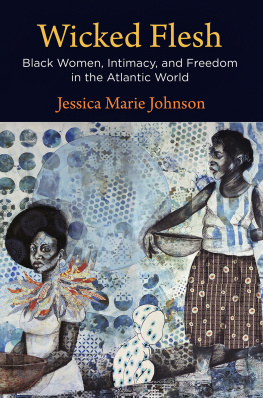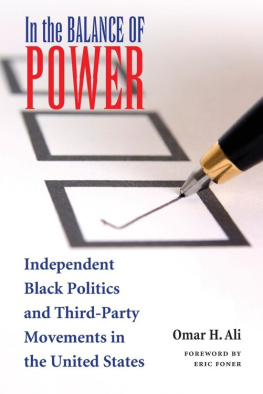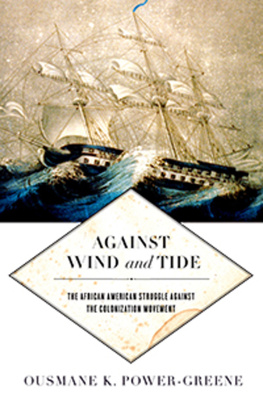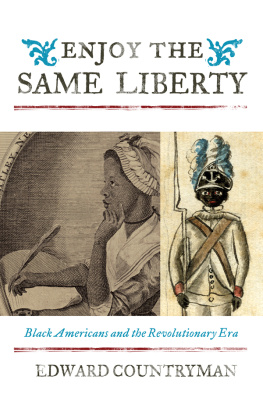In Search of Liberty
Race in the Atlantic World, 17001900
SERIES EDITORS
Richard S. Newman, Rochester Institute of Technology
Patrick Rael, Bowdoin College
Manisha Sinha, University of Connecticut
ADVISORY BOARD
Edward Baptist, Cornell University
Christopher Brown, Columbia University
Vincent Carretta, University of Maryland
Laurent Dubois, Duke University
Erica Armstrong Dunbar, Rutgers University
Douglas Egerton, LeMoyne College
Leslie Harris, Northwestern University
Joanne Pope Melish, University of Kentucky
Sue Peabody, Washington State University, Vancouver
Erik Seeman, State University of New York, Buffalo
John Stauffer, Harvard University
In Search of Liberty
AFRICAN AMERICAN INTERNATIONALISM IN THE NINETEENTH-CENTURY ATLANTIC WORLD
EDITED BY
Ronald Angelo Johnson and Ousmane K. Power-Greene
The University of Georgia Press
ATHENS
2021 by the University of Georgia Press
Athens, Georgia 30602
www.ugapress.org
All rights reserved
Set in 10.5/13.5 Adobe Caslon Pro Regular
by Kaelin Chappell Broaddus
Most University of Georgia Press titles are available from popular e-book vendors.
Printed digitally
Library of Congress Cataloging-in-Publication Data
Names: Johnson, Ronald Angelo, 1970 editor. | Power-Greene, Ousmane K., editor.
Title: In search of liberty : African American internationalism in the nineteenth-century Atlantic world / edited by Ronald Angelo Johnson and Ousmane K. Power-Greene.
Other titles: African American internationalism in the nineteenth-century Atlantic world
Description: Athens : The University of Georgia Press, [2021] | Series: Race in the Atlantic world, 17001900 | Includes bibliographical references.
Identifiers: LCCN 2020055867 | ISBN 9780820360089 (hardback) | ISBN 9780820360102 (paperback) | ISBN 9780820360096 (ebook)
Subjects: LCSH: African AmericansHistory19th century. | African AmericansForeign countriesHistory. | Free blacksAmericaHistory19th century. | Antislavery movementsHistory19th century. | United StatesRace relationsPolitical aspectsHistory19th century. | InternationalismHistory19th century. | African diaspora.
Classification: LCC E185.18 .I525 2021 | DDC 304.8096dc23
LC record available at https://lccn.loc.gov/2020055867
CONTENTS
JAMES SIDBURY |
RONALD ANGELO JOHNSON AND OUSMANE K. POWER-GREENE |
FRANCO PAZ AND HARVEY AMANI WHITFIELD |
MEKALA AUDAIN |
THOMAS MAREITE |
LAWRENCE AJE |
CAREE A. BANTON |
MARCUS BRUCE |
DEXTER J. GABRIEL |
BRANDON R. BYRD |
CLAIRE BOURHIS-MARIOTTI |
PIA WIEGMINK |
ANGELA F. MURPHY |
GERALD HORNE |
PROLOGUE
JAMES SIDBURY
Questions centering on separation and integration structure many of the ways we understand the histories of African-descended people in colonial British America and the United States. That is perhaps most obviously true of our attempts to make sense of the long struggle for civil rights, first for Black peoples right to recognized civic personalities and then, once that was achieved, the ongoing battle for civic equality. But if the focus on questions of separation and integration emerged out of the brute presence of legal segregation in American historyof Jim Crowone need not look long to find the themes of separation and integration arising elsewhere in interesting variations. They are integral to W. E. B. Du Boiss meditation on the two-ness of the Negro People embodied in an American, a Negro; two souls, two thoughts, two unreconciled strivings. Du Boiss impassioned plea for a society that would allow a man to be both a Negro and an American without being cursed and spit upon by his fellows, without having the doors of opportunity closed roughly in his face arose out of a rapidly segregating America and has remained central to our understanding of African American history because it speaks in an idiom rooted in the turn of the twentieth century to issues that reach back into the seventeenth century and push forward to the twenty-first. Those issues are unavoidably both national and international, as Du Bois emphasized by beginning The Souls of Black Folk with the prescient observation, made at the dawn of the new century, that the problem of the Twentieth Century is the problem of the color line.
Du Boiss insight has offered generations of scholars a powerful lens through which to read the rich literature on the cultures forged by enslaved and free Black people during the eighteenth and nineteenth centuries. That may be most obvious and controversial in the opening sentence of the first chapter of Eugene D. Genoveses Roll, Jordan, RollCruel, unjust, exploitative, oppressive, slavery bound two peoples together in bitter antagonism while creating an organic relationship so complex and ambivalent that neither could express the simplest human feelings without reference to the
Analogous themes run through the histories of periods preceding and following Du Boiss formulation of the trope of double consciousness. Almost anywhere we turnto the study of urban residential patterns, of occupational segmentation, of popular culture, of organized labor, or of political behavior in the twentieth centuryissues of racial separation and integration, of inclusion and exclusion, weave through accounts of African American history in ways that profoundly shape understandings of American society, economy, and culture. The complex interplay of patterns of inclusion and exclusion is particularly heightened at this moment as we look back on eight years during which the son of a black Kenyan and a white American served as president of the United States. That obviously represents evidence of inclusionevidence of inclusion that stunned many who believed they would die without witnessing itbut the story is anything but straightforward. Despite being the first presidential candidate in two decades to win two popular majorities and only the third to do so since 1952, Barack Obama suffered unprecedented attacks on his legitimacy, attacks that helped fuel the rise of a successor who campaigned on barely disguised promises of racial exclusion, promises he has kept since assuming office. Inclusion and exclusion, separation and integration have moved in complicated and contradictory directions throughout American history.
The important essays in this book contribute to a new departure in African American history, but one with roots in perennial questions about American history. The move to internationalize African American history confronts what is, on the one hand, a long-standing tendency within much American historiography to separate general American historythe histories This transnational tendency begins with the coerced migration from African societies to the Americas of Black victims of the Atlantic slave trade, which serves as the empirical starting point for a wide range of interpretations of the relationships among the cultures of West and West Central African societies, on the one hand, and the cultures of the enslaved in colonial British America, on the other. It continues with the links among North American slave societies and slave societies elsewhereespecially those in the Caribbeanand with the transnational engagement of Black American activists in the abolition movement. It encompasses the related but distinct emigration and colonization movements and the ways in which Black writers looked beyond the American nation-state when envisioning possibilities for collective progress. None of these is a new topic. None has been ignored by previous scholars.
Next page

